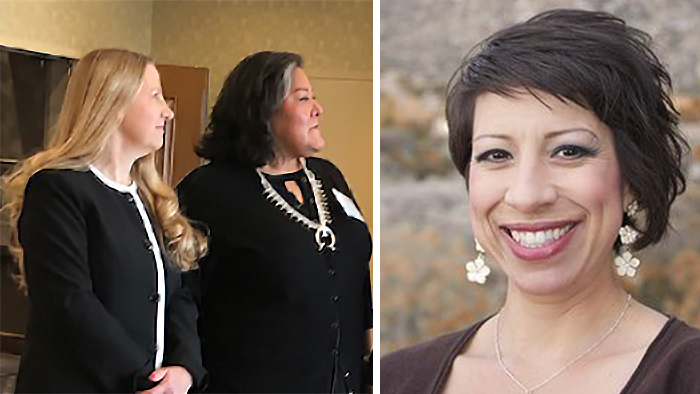
Second Judicial District Children’s Court Judge Marie Ward (left), Special Master Catherine Begaye and David Eisenberg, chief judge of Taos Pueblo Tribal Court (not pictured), lead the new Indian Child Welfare Act court. Cynthia Chavers (right) of the state Children, Youth and Families Department talked about the formation of the court at a recent conference. | Children, Youth and Families Department
ALBUQUERQUE, N.M. — It’s already tough sledding for New Mexico children and families in the state’s fractured foster care and child welfare systems. Those challenges are amplified for Native American families, says Cynthia Chavers, acting field deputy director, metro region for the Santa Fe-based Children, Youth and Families Department.
“What we hear in child welfare is that it’s really hard for our families to feel like they’re receiving adequate support and services,” said Chavers during the annual New Mexico Children’s Law Institute (CLI) conference in January. “That challenge is even greater for an Indian family.”
Under the direction of CYFD Cabinet Secretary Brian Blalock, state leaders announced the creation of New Mexico’s first Indian Child Welfare Act (ICWA) court on Indigenous People’s Day, Oct. 14, 2019. The court, only the nation’s sixth, officially opened on Jan. 1 in the Second Judicial District (Bernalillo County). It will enforce and adjudicate the 1978 congressional law that requires the placement of Native American foster or adopted youth with Indian families, who can help the child maintain a link to tribal culture and traditions.
CYFD and other community partners in Santa Fe and Albuquerque contemplated establishing an ICWA court for years, Chavers said during a conference panel discussion. However, caseworker turnover made it difficult for the department to retain ICWA knowledge and sustain any momentum for the creation of the specialized state court.
“There wasn’t a lot of support to get it done until recently,” Chavers said. About 10% of the state’s foster care population falls under ICWA.
In 2017, Second Judicial District Children’s Court judge Marie Ward and ICWA court hearing officer Catherine Begaye (Diné/Navajo) sketched out an ICWA court blueprint for New Mexico.
But it wasn’t until a November 2018 visit by Judge Katherine Delgado, who helped start an ICWA court in Adams County, Colo., that pushed Ward and Begaye to accelerate. The Second Judicial Court in Albuquerque presides over the largest amount of overall child welfare cases as well as ICWA cases in the state, Ward said.
A few months after Blalock’s January 2019 appointment to cabinet secretary, CYFD created an internal, all-Native female ICWA team of four ICWA caseworkers, an ICWA supervisor and two children’s court attorneys. The ICWA unit educates ICWA court caseworkers, guardian ad litems, lawyers and affiliated parties on the historical and intergenerational trauma that a Native family has experienced. “They need that expertise and knowledge so that Indian families can receive support,” Chavers said.
Both Blalock and ICWA court panelists say that positive discussions have materialized between CYFD and tribal communities such as the Navajo Nation, Santo Domingo Pueblo and Isleta Pueblo. Officials say it’s the first time in recent memory that CYFD has reached out to tribal nations for their vast knowledge and valuable input regarding the intersection of indigenous cultural considerations and state-run child welfare.
The ICWA court, with an ultimate goal of reunifying the child with his or her family, won’t be a staid, docket-only courtroom. In the current self-determination era of federal Indian policy, court officials hope to galvanize the sovereign voice of the tribe or pueblo.
[Related: CYFD Forging Ahead With Native American Court, Kinship Care]
[Related: Carlsbad Center Partnering With Eddy County CASA to Serve More Young People]
[Related: Las Cruces Expanding ‘One-stop Shop’ of Services at Community School to Another]
[Related: McKinley County Could Benefit From New Court For Tribes]
“In traditional child welfare, it’s a polarized system where you have either your biological family or your foster or adoptive family. In tribal communities, family means something much bigger. We want to bring that concept to this court,” Chavers said.
Begaye says she hopes the ICWA court can mimic traditional Native cultural gatherings in order to buttress tribal-state relationships, which can help improve child well-being outcomes for Indian families.
“A couple of times a year, we want to have celebrations with traditional Native food,” Begaye said. “We want to have the pueblos and the Navajo Nation come to us, but most importantly, we want to have the participants at the table so that they can become more and more knowledgeable about the tribes and pueblos.
“We all have the same goal in mind, which is no matter who the child is, but in particular Indian children, we want better outcomes for them,” said Begaye, who added that she hopes to help open more ICWA courts throughout the state. “Our intention is to fulfill the promise of ICWA and to support the longevity of tribes in recognizing their sovereignty and their vested interest in the most precious resource, the children of the tribe.”
This story is part of a Youth Today project on foster care in New Mexico. It’s made possible in part by the May and Stanley Smith Charitable Trust. Youth Today is solely responsible for the content and maintains editorial independence.



























